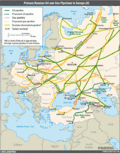| Main page | New articles & Tasks |
 The Energy Portal Welcome to Wikipedia's Energy portal, your gateway to energy. This portal is aimed at giving you access to all energy related topics in all of its forms.
|
Page contents: Selected article • Selected image • Selected biography • Did you know? • General images • Quotations • Related portals • Wikiprojects • Major topics • Categories • Help • Associated Wikimedia |
Introduction
Energy (from Ancient Greek ἐνέργεια (enérgeia) 'activity') is the quantitative property that is transferred to a body or to a physical system, recognizable in the performance of work and in the form of heat and light. Energy is a conserved quantity—the law of conservation of energy states that energy can be converted in form, but not created or destroyed. The unit of measurement for energy in the International System of Units (SI) is the joule (J).
Forms of energy include the kinetic energy of a moving object, the potential energy stored by an object (for instance due to its position in a field), the elastic energy stored in a solid object, chemical energy associated with chemical reactions, the radiant energy carried by electromagnetic radiation, the internal energy contained within a thermodynamic system, and rest energy associated with an object's rest mass. These are not mutually exclusive.
All living organisms constantly take in and release energy. The Earth's climate and ecosystems processes are driven primarily by radiant energy from the sun. The energy industry provides the energy required for human civilization to function, which it obtains from energy resources such as fossil fuels, nuclear fuel, and renewable energy. (Full article...)
Selected article
High-level radioactive waste management concerns management and disposal of highly radioactive materials created during production of nuclear power and nuclear warheads. The technical issues in accomplishing this are daunting, due to the extremely long periods radioactive wastes remain deadly to living organisms. Of particular concern are two long-lived fission products, Technetium-99 (half-life 220,000 years) and Iodine-129 (half-life 15.7 million years), which dominate spent nuclear fuel radioactivity after a few thousand years. The most troublesome transuranic elements in spent fuel are Neptunium-237 (half-life two million years) and Plutonium-239 (half-life 24,000 years). Consequently, high-level radioactive waste requires sophisticated treatment and management to successfully isolate it from the biosphere. This usually necessitates treatment, followed by a long-term management strategy involving permanent storage, disposal or transformation of the waste into a non-toxic form.
Governments around the world are considering a range of waste management and disposal options, usually involving deep-geologic placement, although there has been limited progress toward implementing long-term waste management solutions. This is partly because the timeframes in question when dealing with radioactive waste range from 10,000 to millions of years, according to studies based on the effect of estimated radiation doses.
Selected image

Photo credit: Andreas Tille
Geysers erupt periodically due to surface water being heated by geothermal heat.
Did you know?
- The development of renewable energy in Iceland means that by 2050 the country should be the world's first zero-carbon economy?
- World's two largest oil shale-fired power plants (Narva Power Plants) generate more than 90% of power in Estonia?
- NW Natural in Portland, Oregon was the first gas company in the Pacific Northwest region of the United States when it started in 1859?
- The Assistant Secretary of Energy for Fossil Energy is responsible for America's Strategic Petroleum Reserve?
- Despite declines in production in recent years, Victoria still produces almost 20% of Australia's crude oil?
- 4.26 million tonnes of the Sun are converted to energy every second by nuclear fusion?
- The first gasworks in the United Kingdom was built by the Gas Light and Coke Company, incorporated by Royal Charter in 1812?
- The Baku–Tbilisi–Ceyhan pipeline was a central plot point in the James Bond film The World Is Not Enough?
Selected biography
Born in Ireland, Thomson studied at the University of Glasgow, Scotland. On graduating, he became a mathematics teacher at the Royal Belfast Academical Institution. During his life Thomson published more than 600 scientific papers and filed over 70 patents.
As early as 1845 Thomson pointed out that the experimental results of William Snow Harris were in accordance with the laws of Coulomb. Over the period 1855 to 1867, Thomson collaborated with Peter Guthrie Tait the Treatise on Natural Philosophy that unified the various branches of physical science under the common principle of energy. His inventions included the current balance for the precise specification of the ampere, the standard unit of electric current.
In 1893, Thomson headed an international commission to decide on the design of the Niagara Falls power station. Despite his previous belief in the superiority of direct current electric power transmission, he agreed to use alternating current after seeing a Westinghouse demonstration at the Chicago World's Fair.
In the news
- 19 March 2025 – Russian invasion of Ukraine
- The Russian Ministry of Defense says Ukraine violated the energy infrastructure ceasefire reached by presidents Donald Trump and Vladimir Putin by launching a drone attack on an oil depot in Krasnodar Krai. (The Moscow Times)
- 19 March 2025 – Dakota Access Pipeline protests
- A jury in North Dakota, United States, orders Greenpeace to pay at least $660 million to Energy Transfer Partners, the company responsible for the Dakota Access Pipeline, after ETP sued the organization for holding protests near Standing Rock Reservation concerning the violation of indigenous sovereignty of Native Americans. (DW) (The Guardian)
- 18 March 2025 – February 2025 Putin–Trump call
- U.S. President Donald Trump and Russian President Vladimir Putin agree to an immediate energy infrastructure ceasefire in Ukraine during a phone call, with additional negotiations to begin immediately on a permanent settlement of the conflict. Putin stated that the end of all foreign military and intelligence support to Ukraine would be one condition of such a settlement. (ABC News)
- 17 March 2025 – Russian invasion of Ukraine
- A drone strike in Astrakhan Oblast, Russia, injures one person and causes a fire at an energy facility, according to Astrakhan Oblast governor Igor Babushkin. (Reuters)
- 13 March 2025 – 2025 United States federal mass layoffs
- U.S. District Judge William Alsup of the Northern District of California orders the U.S. departments of agriculture, energy, interior, veterans affairs, and the Treasury to reinstate probationary workers who were fired by the Office of Personnel Management. (Reuters)
General images
Quotations
- "My administration is committed to a leadership role on the issue of climate change. We recognize our responsibility and will meet it - at home, in our hemisphere, and in the world." – George W. Bush, 2001
- "While the Kyoto Protocol is a crucial step forward, that step is far too small. And as we consider how to go further still, there remains a frightening lack of leadership." – Kofi Annan, 2006
- "It is going to be very difficult to keep temperature increases down to between 2 and 3 degrees centigrade [3.6 - 5.4°F]. We should work very hard to do that." – Nicholas Stern, 2006
- "Halting global warming requires urgent, unprecedented international cooperation, but the needed actions are feasible and have additional benefits for human health, agriculture and the environment." – James E. Hansen, 2004
Related portals
WikiProjects
WikiProjects connected with energy:
Other WikiProjects that may be of interest:
Major topics
Major categories
National energy supply, use & conservation
National electricity sector
Politics, economics, environment
- Climate change
- Energy conservation
- Energy economics
- Energy crises
- Energy development
- Energy policy
- Peak oil
Energy sources
- Fuels
- Biofuels
- Fossil fuels
- Fusion power
- Nuclear technology
- Renewable energy
- Energy conversion
- Electric power
- Energy storage
Energy-related design
Scientific usage
Help

Puzzled by energy?
Can't answer your question?
Don't understand the answer?
- Ask at the reference desk
- Read the Wikipedia help pages
For further ideas, to leave a comment, or to learn how you can help improve and update this portal, see the talk page.
Associated Wikimedia
The following Wikimedia Foundation sister projects provide more on this subject:
-
 Commons
Commons
Free media repository -
 Wikibooks
Wikibooks
Free textbooks and manuals -
 Wikidata
Wikidata
Free knowledge base -
 Wikinews
Wikinews
Free-content news -
 Wikiquote
Wikiquote
Collection of quotations -
 Wikisource
Wikisource
Free-content library -
 Wikiversity
Wikiversity
Free learning tools -
 Wiktionary
Wiktionary
Dictionary and thesaurus
-

-

-

-

-
Random portal





















































































































































































